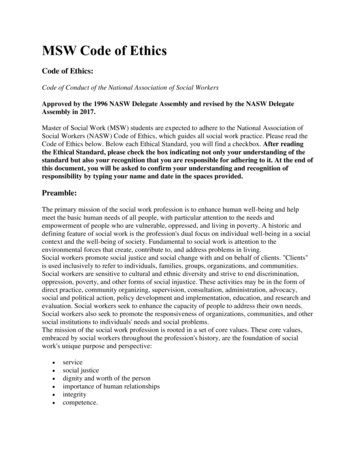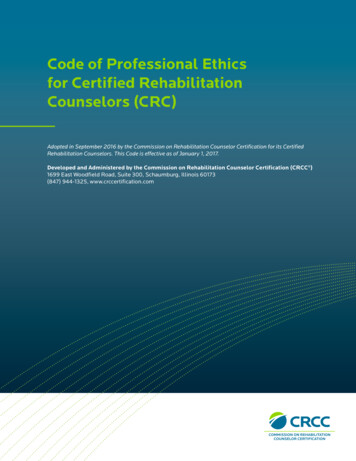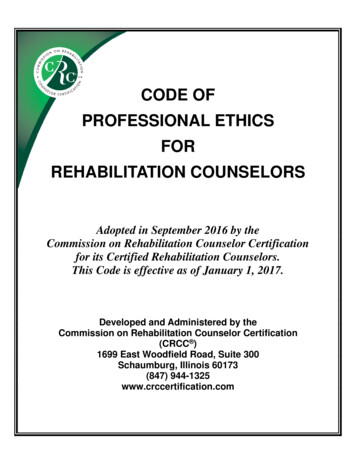
Transcription
MSW Code of EthicsCode of Ethics:Code of Conduct of the National Association of Social WorkersApproved by the 1996 NASW Delegate Assembly and revised by the NASW DelegateAssembly in 2017.Master of Social Work (MSW) students are expected to adhere to the National Association ofSocial Workers (NASW) Code of Ethics, which guides all social work practice. Please read theCode of Ethics below. Below each Ethical Standard, you will find a checkbox. After readingthe Ethical Standard, please check the box indicating not only your understanding of thestandard but also your recognition that you are responsible for adhering to it. At the end ofthis document, you will be asked to confirm your understanding and recognition ofresponsibility by typing your name and date in the spaces provided.Preamble:The primary mission of the social work profession is to enhance human well-being and helpmeet the basic human needs of all people, with particular attention to the needs andempowerment of people who are vulnerable, oppressed, and living in poverty. A historic anddefining feature of social work is the profession's dual focus on individual well-being in a socialcontext and the well-being of society. Fundamental to social work is attention to theenvironmental forces that create, contribute to, and address problems in living.Social workers promote social justice and social change with and on behalf of clients. "Clients"is used inclusively to refer to individuals, families, groups, organizations, and communities.Social workers are sensitive to cultural and ethnic diversity and strive to end discrimination,oppression, poverty, and other forms of social injustice. These activities may be in the form ofdirect practice, community organizing, supervision, consultation, administration, advocacy,social and political action, policy development and implementation, education, and research andevaluation. Social workers seek to enhance the capacity of people to address their own needs.Social workers also seek to promote the responsiveness of organizations, communities, and othersocial institutions to individuals' needs and social problems.The mission of the social work profession is rooted in a set of core values. These core values,embraced by social workers throughout the profession's history, are the foundation of socialwork's unique purpose and perspective: servicesocial justicedignity and worth of the personimportance of human relationshipsintegritycompetence.
This constellation of core values reflects what is unique to the social work profession. Corevalues, and the principles that flow from them, must be balanced within the context andcomplexity of the human experience.Purpose of the NASW Code of Ethics:Professional ethics are at the core of social work. The profession has an obligation to articulateits basic values, ethical principles, and ethical standards. The NASW Code of Ethics sets forththese values, principles, and standards to guide social workers' conduct. The Code is relevant toall social workers and social work students, regardless of their professional functions, thesettings in which they work, or the populations they serve.The NASW Code of Ethics serves six purposes:1. The Code identifies core values on which social work's mission is based.2. The Code summarizes broad ethical principles that reflect the profession's core valuesand establishes a set of specific ethical standards that should be used to guide social workpractice.3. The Code is designed to help social workers identify relevant considerations whenprofessional obligations conflict or ethical uncertainties arise.4. The Code provides ethical standards to which the general public can hold the social workprofession accountable.5. The Code socializes practitioners new to the field to social work's mission, values, ethicalprinciples, and ethical standards.6. The Code articulates standards that the social work profession itself can use to assesswhether social workers have engaged in unethical conduct. NASW has formal proceduresto adjudicate ethics complaints filed against its members.* In subscribing to this Code,social workers are required to cooperate in its implementation, participate in NASWadjudication proceedings, and abide by any NASW disciplinary rulings or sanctionsbased on it.The Code offers a set of values, principles, and standards to guide decision making and conductwhen ethical issues arise. It does not provide a set of rules that prescribe how social workersshould act in all situations. Specific applications of the Code must take into account the contextin which it is being considered and the possibility of conflicts among the Code's values,principles, and standards. Ethical responsibilities flow from all human relationships, from thepersonal and familial to the social and professional.Furthermore, the NASW Code of Ethics does not specify which values, principles, and standardsare most important and ought to outweigh others in instances when they conflict. Reasonabledifferences of opinion can and do exist among social workers with respect to the ways in whichvalues, ethical principles, and ethical standards should be rank ordered when they conflict.Ethical decision making in a given situation must apply the informed judgment of the individualsocial worker and should also consider how the issues would be judged in a peer review processwhere the ethical standards of the profession would be applied.Ethical decision making is a process. In situations when conflicting obligations arise, socialworkers may be faced with complex ethical dilemmas that have no simple answers. Social
workers should take into consideration all the values, principles, and standards in this Code thatare relevant to any situation in which ethical judgment is warranted. Social workers' decisionsand actions should be consistent with the spirit as well as the letter of this Code.In addition to this Code, there are many other sources of information about ethical thinking thatmay be useful. Social workers should consider ethical theory and principles generally, socialwork theory and research, laws, regulations, agency policies, and other relevant codes of ethics,recognizing that among codes of ethics social workers should consider the NASW Code of Ethicsas their primary source. Social workers also should be aware of the impact on ethical decisionmaking of their clients' and their own personal values and cultural and religious beliefs andpractices. They should be aware of any conflicts between personal and professional values anddeal with them responsibly. For additional guidance social workers should consult the relevantliterature on professional ethics and ethical decision making and seek appropriate consultationwhen faced with ethical dilemmas. This may involve consultation with an agency-based or socialwork organization's ethics committee, a regulatory body, knowledgeable colleagues, supervisors,or legal counsel.Instances may arise when social workers' ethical obligations conflict with agency policies orrelevant laws or regulations. When such conflicts occur, social workers must make a responsibleeffort to resolve the conflict in a manner that is consistent with the values, principles, andstandards expressed in this Code. If a reasonable resolution of the conflict does not appearpossible, social workers should seek proper consultation before making a decision.The NASW Code of Ethics is to be used by NASW and by individuals, agencies, organizations,and bodies (such as licensing and regulatory boards, professional liability insurance providers,courts of law, agency boards of directors, government agencies, and other professional groups)that choose to adopt it or use it as a frame of reference. Violation of standards in this Code doesnot automatically imply legal liability or violation of the law. Such determination can only bemade in the context of legal and judicial proceedings. Alleged violations of the Code would besubject to a peer review process. Such processes are generally separate from legal oradministrative procedures and insulated from legal review or proceedings to allow the professionto counsel and discipline its own members.A code of ethics cannot guarantee ethical behavior. Moreover, a code of ethics cannot resolve allethical issues or disputes or capture the richness and complexity involved in striving to makeresponsible choices within a moral community. Rather, a code of ethics sets forth values, ethicalprinciples, and ethical standards to which professionals aspire and by which their actions can bejudged. Social workers' ethical behavior should result from their personal commitment to engagein ethical practice. The NASW Code of Ethics reflects the commitment of all social workers touphold the profession's values and to act ethically. Principles and standards must be applied byindividuals of good character who discern moral questions and, in good faith, seek to makereliable ethical judgments.With growth in the use of communication technology in various aspects of social work practice,social workers need to be aware of the unique challenges that may arise in relation to themaintenance of confidentiality, informed consent, professional boundaries, professionalcompetence, record keeping, and other ethical considerations. In general, all ethical standards inthis Code of Ethics are applicable to interactions, relationships, or communications whether theyoccur in person or with the use of technology. For the purposes of this Code, technology-assistedsocial work services include any social work services that involve the use of computers, mobileor landline telephones, tablets, video technology, or other electronic or digital technologies; this
includes the use of various electronic or digital platforms, such as the Internet, online socialmedia, chat rooms, text messaging, e-mail, and emerging digital applications. Technologyassisted social work services encompass all aspects of social work practice, includingpsychotherapy; individual, family, or group counseling; community organization; administration;advocacy; mediation; education; supervision; research; evaluation; and other social workservices. Social workers should keep apprised of emerging technological developments that maybe used in social work practice and how various ethical standards apply to them.Ethical Principles:The following broad ethical principles are based on social work's core values of service, socialjustice, dignity and worth of the person, importance of human relationships, integrity, andcompetence. These principles set forth ideals to which all social workers should aspire.Value: ServiceEthical Principle: Social workers' primary goal is to help people in need and to address socialproblemsSocial workers elevate service to others above self-interest. Social workers draw on theirknowledge, values, and skills to help people in need and to address social problems. Socialworkers are encouraged to volunteer some portion of their professional skills with no expectationof significant financial return (pro bono service).Value: Social JusticeEthical Principle: Social workers challenge social injustice.Social workers pursue social change, particularly with and on behalf of vulnerable and oppressedindividuals and groups of people. Social workers' social change efforts are focused primarily onissues of poverty, unemployment, discrimination, and other forms of social injustice. Theseactivities seek to promote sensitivity to and knowledge about oppression and cultural and ethnicdiversity. Social workers strive to ensure access to needed information, services, and resources;equality of opportunity; and meaningful participation in decision making for all people.Value: Dignity and Worth of the PersonEthical Principle: Social workers respect the inherent dignity and worth of the person.Social workers treat each person in a caring and respectful fashion, mindful of individualdifferences and cultural and ethnic diversity. Social workers promote clients' socially responsibleself-determination. Social workers seek to enhance clients' capacity and opportunity to changeand to address their own needs. Social workers are cognizant of their dual responsibility toclients and to the broader society. They seek to resolve conflicts between clients' interests andthe broader society's interests in a socially responsible manner consistent with the values, ethicalprinciples, and ethical standards of the profession.Value: Importance of Human Relationships
Ethical Principle: Social workers recognize the central importance of human relationships.Social workers understand that relationships between and among people are an important vehiclefor change. Social workers engage people as partners in the helping process. Social workers seekto strengthen relationships among people in a purposeful effort to promote, restore, maintain, andenhance the well-being of individuals, families, social groups, organizations, and communities.Value: IntegrityEthical Principle: Social workers behave in a trustworthy manner.Social workers are continually aware of the profession's mission, values, ethical principles, andethical standards and practice in a manner consistent with them. Social workers act honestly andresponsibly and promote ethical practices on the part of the organizations with which they areaffiliated.Value: CompetenceEthical Principle: Social workers practice within their areas of competence and develop andenhance their professional expertise.Social workers continually strive to increase their professional knowledge and skills and to applythem in practice. Social workers should aspire to contribute to the knowledge base of theprofession.Confirmation *I have read and agree with the above statementI have NOT read and agree with the above statementEthical StandardsThe following ethical standards are relevant to the professional activities of all social workers.These standards concern (1) social workers' ethical responsibilities to clients, (2) social workers'ethical responsibilities to colleagues, (3) social workers' ethical responsibilities in practicesettings, (4) social workers' ethical responsibilities as professionals, (5) social workers' ethicalresponsibilities to the social work profession, and (6) social workers' ethical responsibilities tothe broader society.Some of the standards that follow are enforceable guidelines for professional conduct, and someare aspirational. The extent to which each standard is enforceable is a matter of professionaljudgment to be exercised by those responsible for reviewing alleged violations of ethicalstandards.1. Social Workers' Ethical Responsibilities To Clients:1.01 Commitment to Clients
Social workers' primary responsibility is to promote the well-being of clients. In general, clients'interests are primary. However, social workers' responsibility to the larger society or specificlegal obligations may, on limited occasions, supersede the loyalty owed clients, and clientsshould be so advised. (Examples include when a social worker is required by law to report that aclient has abused a child or has threatened to harm self or others.)1.02 Self-DeterminationSocial workers respect and promote the right of clients to self-determination and assist clients intheir efforts to identify and clarify their goals. Social workers may limit clients' right to selfdetermination when, in the social workers' professional judgment, clients' actions or potentialactions pose a serious, foreseeable, and imminent risk to themselves or others.1.03 Informed Consent1. Social workers should provide services to clients only in the context of a professionalrelationship based, when appropriate, on valid informed consent. Social workers shoulduse clear and understandable language to inform clients of the purpose of the services,risks related to the services, limits to services because of the requirements of a third-partypayer, relevant costs, reasonable alternatives, clients' right to refuse or withdraw consent,and the time frame covered by the consent. Social workers should provide clients with anopportunity to ask questions.2. In instances when clients are not literate or have difficulty understanding the primarylanguage used in the practice setting, social workers should take steps to ensure clients'comprehension. This may include providing clients with a detailed verbal explanation orarranging for a qualified interpreter or translator whenever possible.3. In instances when clients lack the capacity to provide informed consent, social workersshould protect clients' interests by seeking permission from an appropriate third party,informing clients consistent with their level of understanding. In such instances socialworkers should seek to ensure that the third party acts in a manner consistent with clients'wishes and interests. Social workers should take reasonable steps to enhance such clients'ability to give informed consent.4. In instances when clients are receiving services involuntarily, social workers shouldprovide information about the nature and extent of services and about the extent ofclients' right to refuse service.5. Social workers should discuss with clients the social workers' policies concerning the useof technology in the provision of professional services.6. Social workers who use technology to provide social work services should obtaininformed consent from the individuals using these services during the initial screening orinterview and prior to initiating services. Social workers should assess clients' capacity toprovide informed consent and, when using technology to communicate, verify theidentity and location of clients.7. Social workers who use technology to provide social work services should assess theclients' suitability and capacity for electronic and remote services. Social workers shouldconsider the clients' intellectual, emotional, and physical ability to use technology toreceive services and ability to understand the potential benefits, risks, and limitations of
such services. If clients do not wish to use services provided through technology, socialworkers should help them identify alternate methods of service.8. Social workers should obtain clients' informed consent before making audio or videorecordings of clients or permitting observation of service provision by a third party.9. Social workers should obtain client consent before conducting an electronic search on theclient. Exceptions may arise when the search is for purposes of protecting the client orothers from serious, foreseeable, and imminent harm, or for other compellingprofessional reasons.1.04 Competence1. Social workers should provide services and represent themselves as competent onlywithin the boundaries of their education, training, license, certification, consultationreceived, supervised experience, or other relevant professional experience.2. Social workers should provide services in substantive areas or use interventiontechniques or approaches that are new to them only after engaging in appropriate study,training, consultation, and supervision from people who are competent in thoseinterventions or techniques.3. When generally recognized standards do not exist with respect to an emerging area ofpractice, social workers should exercise careful judgment and take responsible steps(including appropriate education, research, training, consultation, and supervision) toensure the competence of their work and to protect clients from harm.4. Social workers who use technology in the provision of social work services should ensurethat they have the necessary knowledge and skills to provide such services in a competentmanner. This includes an understanding of the special communication challenges whenusing technology and the ability to implement strategies to address these challenges.5. Social workers who use technology in providing s
The NASW Code of Ethics is to be used by NASW and by individuals, agencies, organizations, and bodies (such as licensing and regulatory boards, professional liability insurance providers, courts of law, agency boards of directors, government agencies, and other professional groups) t











